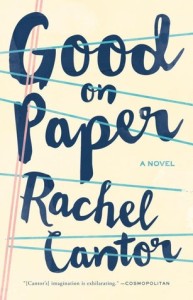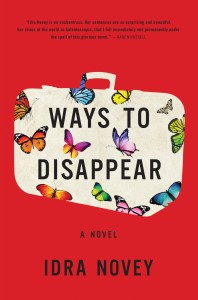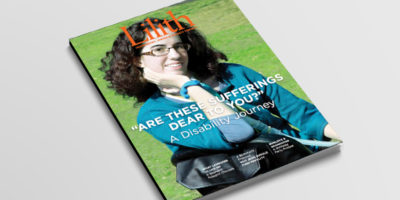Found in Translation: Deeper Meanings
 In unexpected and delightfully different ways, two new novels of literary mysteries with undulating plotlines and off-beat sensibilities revolve around Jewish women translators who find clues that not only unravel a mystery but, eventually, bring deeper self-understanding. In each, a sense of humor pulsates; one quirky, one droll.
In unexpected and delightfully different ways, two new novels of literary mysteries with undulating plotlines and off-beat sensibilities revolve around Jewish women translators who find clues that not only unravel a mystery but, eventually, bring deeper self-understanding. In each, a sense of humor pulsates; one quirky, one droll.
Good on Paper by Rachel Cantor (Melville House, $20.75) gives readers Shira Greene, an adrift 44-year-old single mom raising 3rd-grader-to-be Andi on the Upper West Side at the end of 1999. Shira has been fending her way through unsuitable temp jobs and romances with the help of Ahmad, “friend of my youth, roommate, co-parent,” also a painter and economist.
Good on Paper, Cantor’s second novel (her first: A Highly Unlikely Scenario), brings a postmodern twist to Shira’s life via a postmodern poetry project. With a few small-press stories and translations behind her, Shira gets an unlikely call from the Nobel Prize-winning poet Romei. When he asks her to translate his new series, a take on Dante’s La Vita Nuova (The New Life), she accepts, long fascinated with Dante’s treatment of his love for Beatrice. Yet in each new set of pages he faxes, Shira finds bizarre wordplays, untranslatable yet rife with personal connotations.
This La Vita Nuova, ultimately, will be transformative for Shira, as its underlying truth comes to light. In the meantime, she tries to raise her daughter, make peace with her roomie, and maybe even give her love life a chance with the literary rabbi from across the street. (When not performing simchas, Benny runs a bookstore called People of the Book and the lit mag that published Shira’s writing.)
 Ways to Disappear (Little, Brown, $25) is a debut novel from Idra Novey, who teaches at Princeton and is a poet, writer, and translator of the work of Brazilian Jewish novelist Clarice Lispector. The novel’s protagonist is Emma Neufeld, a translator stifled by her life in Pittsburgh with a boring boyfriend, Miles, whose dullness Novey brings to life with a precise finesse.
Ways to Disappear (Little, Brown, $25) is a debut novel from Idra Novey, who teaches at Princeton and is a poet, writer, and translator of the work of Brazilian Jewish novelist Clarice Lispector. The novel’s protagonist is Emma Neufeld, a translator stifled by her life in Pittsburgh with a boring boyfriend, Miles, whose dullness Novey brings to life with a precise finesse.
The Brazilian writer Beatriz Yagoda, whose work has been the backbone of Neufeld’s for 10 years, is reported to have climbed up an almond tree with a cigar between her teeth, leaving no trace. Brazil is flummoxed, as are her sexy son, Marcus, and her union-busting daughter, Raquel. The news of her author’s disappearance serves as a siren call for Emma, propelled to Brazil by the conviction that her insights into Yagoda’s oeuvre will shed light on
the disappearance.
Like Beatriz’s stories, what happens in Brazil is surreal for Emma, who faces temptations in Marcus and violent threats from a loan shark trying to recoup Beatriz’s six-figure gambling debts. At the same time, Raquel struggles to understand her lauded but imperfect mother and to uncover a truth about herself hidden in an unpublished story about a shadow from the past.
As tensions build, and threats are fulfilled, Emma takes respite in her notebook, jotting down between calamities what increasingly takes shape as a story of her own.
Both Cantor and Novey reflect repeatedly on the act and art of translation, on what it means to bring the words of others into life in a foreign tongue.
As Novey writes of Emma, reading aloud to Marcus her translation of his mother’s words: “Wasn’t the splendor of translation this very thing — to discover sentences this beautiful and then have the chance to make someone else hear their beauty who had yet to hear it? To arrive, at least once, at a moment this intimate and singular, which would not be possible without these words arranged in this order on this page?”
For Cantor’s Shira, “I’d once loved translation, before I got all complicated about it. Weighing poetic elements, deciding which to highlight, which to sacrifice — because not everything can survive translation.”
While utterly different in tone and temperament, both novels will delight many a feminist reader, since Shira and Emma find far more than clues. In the end, it’s a tribute to the translator’s most honed skill — attentiveness to detail — that each discovers, and rightly claims, her self-agency.
Erica Brody is a writer, editor, and strategist who says she loves chocolate egg creams and wordplay with equal abandon.


